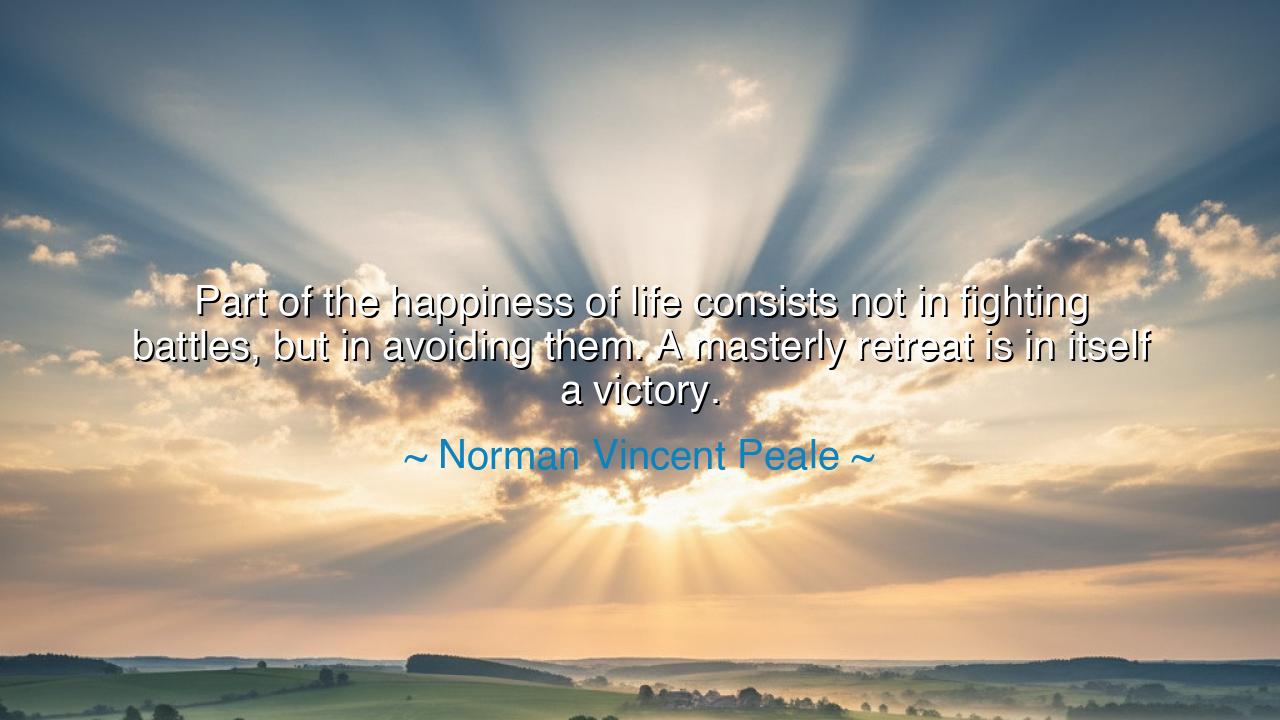
Part of the happiness of life consists not in fighting battles
Part of the happiness of life consists not in fighting battles, but in avoiding them. A masterly retreat is in itself a victory.






“Part of the happiness of life consists not in fighting battles, but in avoiding them. A masterly retreat is in itself a victory.” Thus spoke Norman Vincent Peale, the great teacher of hope and faith, whose words remind us that not all triumphs are won by confrontation, nor all defeats marked by withdrawal. In this wisdom, he reveals a truth known to the ancients but forgotten by the proud: that peace is not the absence of struggle, but the mastery of restraint. To retreat with dignity, to choose harmony over contention, to walk away from needless conflict — these are not acts of weakness, but of strength, discipline, and deep understanding.
The meaning of Peale’s words reaches far beyond the battlefield; it touches every corner of human life. The world urges us to fight — for status, for pride, for the last word. Yet the wise soul knows that constant conflict drains the spirit, and that happiness cannot thrive in the soil of perpetual strife. Not every hill is worth dying on, nor every argument worth winning. Sometimes, the greatest victory is not in the conquest of others, but in the conquest of the self — the quiet mastery of ego, anger, and impulse. A masterly retreat is not surrender; it is discernment — the art of knowing when to yield and when to stand firm, when to speak and when to remain silent.
The origin of this insight lies in Peale’s lifelong mission to blend spiritual wisdom with practical living. As the author of The Power of Positive Thinking, he sought to free the human heart from anxiety and bitterness, teaching that peace of mind was the true measure of success. He had seen how men and women exhausted themselves in endless battles — with others, with fate, and with their own discontent — and how such struggles left them weary and joyless. Thus, he counseled the path of serenity: to rise above quarrels, to avoid battles born of pride, and to save one’s strength for the pursuits that nourish the soul. For Peale, happiness was not found in victory over others, but in victory over needless conflict.
History offers luminous examples of this truth. Consider the great Abraham Lincoln, who, though often provoked by malice and insult, refused to answer anger with anger. During the Civil War, he was criticized, mocked, and misrepresented, yet he rarely retaliated. “I do not think much of a man who is not wiser today than he was yesterday,” he once said — and by that wisdom, he turned from petty disputes to higher purposes. His masterly retreats from quarrel preserved his strength for the work that mattered: the preservation of the Union and the healing of a wounded nation. His restraint, born not of weakness but of vision, became his quiet victory.
To live by this teaching requires courage — the courage to let go of the need to win every battle. The proud man cannot retreat, for he mistakes silence for defeat. But the wise man knows that every moment spent in anger is stolen from peace. To avoid battles is not to run from life, but to choose which battles are worthy of one’s spirit. There are times when one must fight — for justice, for truth, for love — but these should be rare and sacred struggles. The rest are distractions, fires lit by vanity and fed by noise. To retreat from them is to preserve the heart, to walk the path of calm and clarity.
In this sense, Peale’s words echo the wisdom of Sun Tzu, the ancient strategist who said that the greatest warrior wins without fighting. The same principle governs not only war but the soul: mastery of the self is the highest form of victory. Each masterly retreat saves us from wasting energy on what cannot bring joy or growth. It teaches us that happiness lies not in domination but in freedom — freedom from resentment, from pettiness, from the endless need to prove ourselves.
The lesson, then, is this: choose your battles with wisdom, and walk away from the rest with grace. When faced with conflict, pause before you strike; ask yourself whether victory will bring peace or simply more strife. Learn the art of retreat, not in cowardice, but in courage — for it takes far more strength to turn away from fury than to indulge it. In doing so, you will preserve your happiness, your dignity, and your inner harmony. For as Norman Vincent Peale teaches, the one who learns to retreat wisely does not lose — he transcends. And in that transcendence lies the deepest victory a human heart can know: the peace that no quarrel can disturb, and the joy that no defeat can take away.






AAdministratorAdministrator
Welcome, honored guests. Please leave a comment, we will respond soon